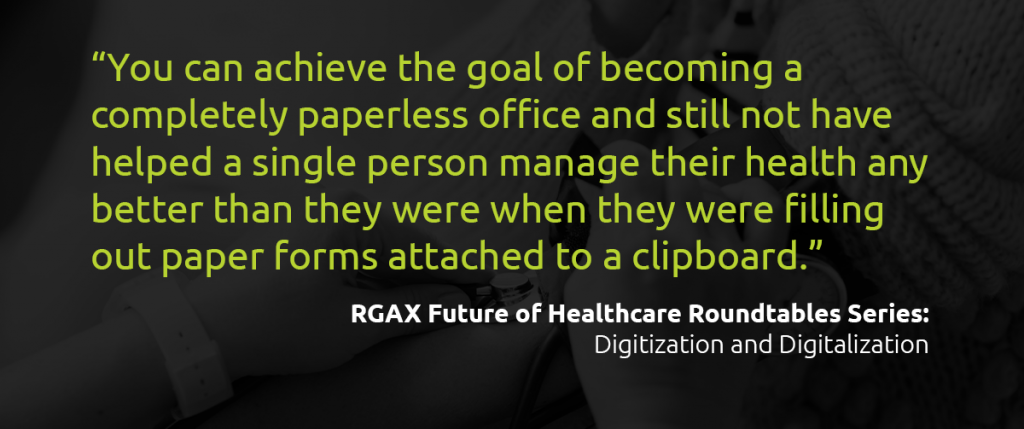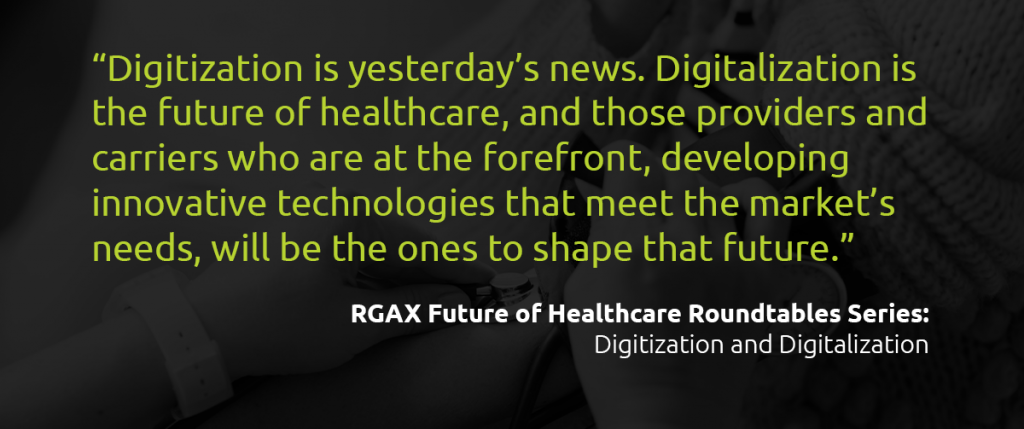Digitization Versus Digitalization in Healthcare
With advancements in technology and science, healthcare has come a long way in the last 100 years. In this digital age, the pace of change is accelerating — redefining healthcare as we know it. To examine these changes, the technologies propelling them forward and the impacts on life insurance, RGAX is conducting a series of roundtables with industry experts.
In a previous roundtable, we focused on the future of eldercare. In that discussion, I spoke with three technologists deeply involved in creating innovative health and insurtech solutions for aging populations: Dr. James Somauroo, Founder of somX; Amer Fasihi, Founder and CEO of Kraydel; and Max Parmentier, Founder and CEO of Birdie. You can read my recap of our discussion here.
This roundtable, hosted by Dr. James Somauroo of somX, focused on the digitization and digitalization of healthcare. He was joined by Stephen Bourke, co-founder of Echo, an online pharmacy acquired by McKesson last year, and Emmanuel Djengue, Innovations Director for RGAX EMEA.

What’s the Difference Between Digitization and Digitalization in Healthcare?
For healthcare organizations and carriers looking to leverage technology to achieve their business goals and improve customer outcomes, recognizing the difference between these two terms is crucial.
Digitization in healthcare simply refers to the conversion of analog systems to digital. This conversion has been underway for a long time, pushed along by the occasional government mandate for technologies like electronic health records (EHR) and the desire of carriers and providers to be more efficient.
Digitization brings inherent benefits, such as less manual filing of paperwork and easier access to historical records, but moving to electronic healthcare systems does relatively little to improve a population’s or even an individual’s health. You can achieve the goal of becoming a completely paperless office and still not have helped a single person manage their health any better than when they were filling out paper forms attached to a clipboard.
On the other hand, digitalization is the use of technologies to improve health outcomes while still achieving the carrier or provider’s internal efficiency goals. Digitization is yesterday’s news; digitalization is the future of healthcare. Those providers and carriers at the forefront, developing innovative technologies that meet the market’s evolving needs, will be the ones to shape that future.

The Importance of Execution in Insurtech
While discussing the current state of digitalization in healthcare, Stephen mentioned that his business wasn’t the first online pharmacy in the U.K. It wasn’t even the tenth. His success was based on his company’s ability to solve customer challenges the other online pharmacies did not. Prioritizing customers’ challenges is something RGAX places great emphasis on whenever we are looking to bring new ideas, products, or services to the life insurance industry.
“Ideas are cheap. It is how you execute and how you serve the market that matters.”
Stephen Bourke, Co-founder of Echo
This roundtable also discusses how innovators should approach the execution of an idea. Though each might emphasize one type of user over another, all agreed that good design has to focus on the customers’ as well as the physicians’ needs. Emmanuel likened it to the Uber experience. Uber wasn’t the first ride-sharing service, but the company did something other services didn’t do: made the experience positive for both the customer and the driver. As a result, more people wanted to drive for Uber.
“When looking at healthcare in general, if we talk about digitalization, we need to think of the practitioners as well as the people working at hospitals. We sometimes forget about them, but they are a vital part of the whole ecosystem.”
Emmanuel Djengue, Innovations Director at RGAX
In the same way, if you’re creating an app that you want people to use to improve their health, you may be able to drive adoption faster if you also consider how physicians might leverage the technology. If it is useful to physicians and the experience is enjoyable, they can use it to promote patients’ health. If physicians use the app, patients may also be more likely to stick with it. In the end, it’s a win-win.
On a final note, Stephen also brought up one of the biggest problems we face when creating apps designed to be used by physicians in their practices. Some processes are mandated by law, so they’re easily definable, but not everything is so clear cut. Individual physicians have their own way of doing things. The same holds for the clinics, hospitals, and other institutions they work for. It’s not easy to create apps that have broad applicability to the way all providers conduct their business.
“We are not selling pizzas here. We are not even dealing with cashing checks. We are dealing with very intimate, very personal, and very emotional topics when we work in the healthcare space.”
Stephen Bourke, Co-founder of Echo
Given the close tie healthcare has to life insurance, this sensitivity to intimate, emotional topics is crucial when considering innovations in this industry, not to mention the obstacles it can present.
👂 Listen to Future of Healthcare Roundtables Series: Digitization and Digitalization, Episode 1 of 2

